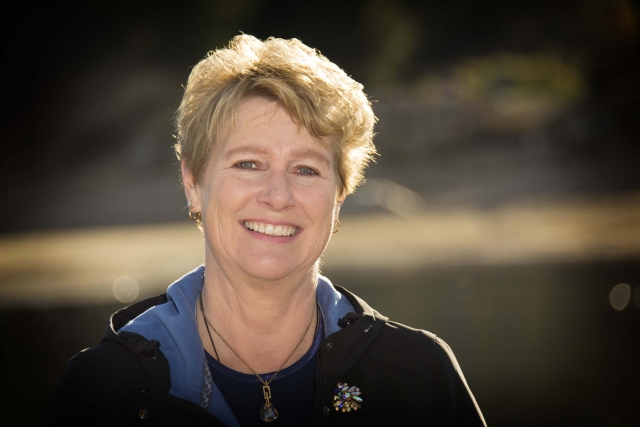Candidates Answer Four Questions (or not): Part I
Last week, I posted an editorial criticizing negative campaigning, and posed questions for our local candidates to answer — without mentioning other candidates or other parties. Here are two of our local candidates’ answers to the first set of four questions; the third candidate, Liberal Jim Postnikoff, was unfortunately unable to respond in time. Where possible, I have looked through the Liberal platform and attempted to find the Liberal approach on the topics of the questions, and inserted what I could find. My apologies to Jim Postnikoff for the incomplete and rudimentary nature of the results; I have provided links to the Liberal platform so that readers can more easily find answers for themselves.
Readers: Please do not attach any significance to the order of the candidates’ questions; I’ve posted them in the order they arrived. This week’s picture of Katrine Conroy was chosen for the same reason; next week there will be a picture of Samantha Troy; and the final week, when the candidates can publish a statement about themselves and/or the issues important to them and their parties, I’ll publish a picture of Jim Postnikoff, if he submits one.
There is an All Candidates Forum on Thursday, April 20, at the Trail Memorial Gym. Doors open at 6:30; call to order at 7:00 sharp. The moderator will be Bill Profili. Meanwhile, or afterwards, readers can increase their understanding of the parties’ positions by comparing the answers given below.
Question #1: What is your party’s position on climate change, and does your party propose to take any actions to mitigate climate change? What actions?
NDP candidate Katrine Conroy says:
As a political party we understand that climate change is one of the most significant challenges we face. We need to take action to modernize our economy, improve transportation and lower our impact on the environment. By protecting our environment and taking action on climate change we will build a sustainable economy and create good jobs in every sector and every region of our province, for the present and the future. As a part of our platform we have announced that we will invest in public transit, energy efficiency, clean technology, and other major initiatives that will reduce our dependence on fossil fuels. We will invest new carbon tax revenues in measures that help families and reduce carbon pollution.
We will also renew the Climate Leadership panel within our first 100 days of being in office and work towards implementing their recommendations under our core principles for climate action. We will put BC on a path to meeting BC’s legislated 2050 greenhouse gas emission reduction target of 80 per cent below 2007 levels and will set a new legislated 2030 reduction target of 40 per cent below 2007 levels.
From investing in reforestation, to building new rapid transit solutions, to a comprehensive clean energy program called PowerBC, the BC NDP will invest in the long-term success of our economy, while doing our part to fight climate change. Together, these programs will create thousands of jobs, and strengthen our economy for today and into the future.
Working within the parameters of the federal government’s mandate, we will work to provide predictability for BC businesses and protect BC families from facing another hit on their pocketbook, while taking action to further reduce carbon emissions. As outlined in our Clean Growth, Climate Action plan: We will phase in the federally mandated $50/tonne carbon price by 2022 over three years, starting in 2020. We will create a new climate action rebate cheque for low and middle-income families. This cheque will go to 80 per cent of BC households, with a majority receiving more back from this rebate than they pay in new carbon taxes. The rebate will be issued at the start of each year, so families aren’t out of pocket.
(The NDP platform is available here.)
Green Party’s local candidate Samantha Troy says:
Climate change is not just an environmental issue. Acting on climate change is about positioning B.C. to succeed in the emerging economy of the future, and about the world we will leave for our children. The Greenhouse Gas Reduction Targets Act ( GGRTA ) came into force in January 2008. GGRTA set legislated targets for reducing greenhouse gas emissions by 33 percent below 2007 levels by 2020, and 80 percent below 2007 levels by 2050. The Climate Leadership Team (CLT) acknowledged that B.C. will not meet its 2020 targets; they recommend an interim target of a 40 percent reduction below 2007 levels by 2030. B.C Greens believe that this is a realistic target if addressed with immediate and decisive action.
A B.C. Green government will progressively increase the carbon tax by $10 per year beginning January 2018. Putting a price on carbon is widely acknowledged as the best tool for reducing carbon emissions. Predictable, planned increases will give businesses the certainty they need to successfully navigate the transition to a low carbon economy. A B.C. Green government will extend the carbon tax to fugitive and vented emissions — unintentional emissions from the production, processing, transmission, storage and delivery of fossil fuels, and combustion of fossil fuels not used to generate useful heat or electricity. Currently, the B.C. carbon tax does not apply to fugitive emissions, although technological advancements have made it easier to track and reduce them. A Green government will apply the fugitive rate for the carbon tax to forest slash pile burning. B.C. Greens will establish an emissions reduction target for carbon neutral government and allow public service agencies to invest in internal emissions reductions, rather than purchasing offsets. Funding that used to purchase offsets could instead be invested in reducing emissions in public service facilities or operations.
Knowledge and awareness are critical to behaviour change to reduce carbon emissions. A B.C. Green government will expand the provision of public information regarding ways to reduce carbon emissions. We will act to promote choices with a lower carbon footprint and will act to facilitate modal switching. Initiatives would include increased funding for public transport, affordable transit fares, ensuring frequency of transit meets passenger needs, increasing investments in walking and biking infrastructure.
We can realize efficiency gains in several areas including: employing more energy efficient machinery and appliances, energy efficient buildings and communities, enhanced efficiency of waste management, and management of fugitive emissions, especially oil and gas.
Two major areas of opportunity for GHG reductions from the use of low carbon fuels and materials are electrification and fuel switching. A B.C. Green government will revisit the mandate of B.C. Hydro to optimize support for clean energy development. We will work with neighbouring jurisdictions to expedite the phase out of thermal electricity generation.
A carbon sink is anything that stores more carbon than it releases, including forests and soil. A B.C. Green government will implement a forest carbon strategy to take full advantage of the opportunities created by natural carbon sinks.
(The BC Green Party platform website is at this link.)
Liberal Candidate Jim Postnikoff was unable to respond in time, but the Liberal Party’s platform promotes completing the Site C dam, and more development of Liquefied Natural Gas (LNG) by hydraulic fracturing (fracking), and particularly, exploiting the oil and shale gas resources of the Montney Basin in Northeastern BC, and constructing more pipelines and more LNG terminals; it also promises to maintain its freeze on the carbon tax until 2021, and to “ensure that energy-intensive, trade-exposed industries are protected from any potential increase in the carbon tax.”
Question #2: What is your party’s position on the large and growing gap between our wealthiest citizens and our poorest? Does your party propose any measures to narrow that gap?
NDP Candidate Katrine Conroy says:
In BC right now one in five children lives in poverty and food bank use has broken records two years in a row. More than 3,000 children have been added to food bank rolls in the last 10 years.
The BC NDP have put forward a poverty reduction plan five different times in the Provincial Legislature. At this present time we are the only province in Canada that doesn’t have one. As the cost of living in BC has skyrocketed, the support for British Columbians in need of basic assistance has been frozen for ten years. We have announced in our platform that we will immediately raise all income assistance and disability rates by $100 per month. We will also encourage and support assistance recipients as they re-enter the workforce by allowing them to keep an additional $200 a month in earnings exemptions. We will end the disability bus pass clawback, fully restoring the BC Bus Pass program for people with disabilities. We will bring together disability advocates and organizations, people living in poverty, poverty reduction groups and others who are committed to a Better BC to develop a poverty reduction strategy and examine the full scope of poverty reduction initiatives. Their work will help us meet our goal of helping all individuals live lives of dignity, respect, and opportunity. We will partner with the federal government, local municipalities, agencies and community groups to create an immediate homelessness action plan, which includes a provincial poverty reduction plan. We will ensure that initiatives in other areas such as mental health, social assistance, justice, safety, health, and more are tied into the action plan. We will conduct a province-wide homeless count and commit to reduce the homeless population through permanent housing and services as part of our action plan on housing.
We also understand that we need to help make life more affordable for average British Columbians. We will get rid MSP fees, build 114,000 rental and co-op homes, and provide renters with an annual rental home credit of $400. To assist families with young children we will bring in $10 a day childcare and for College and University students we will eliminate interest on student loans and give students a $1000 completion grant. We will also freeze BC Hydro and ICBC rates.
Green Party candidate Samantha Troy says:
The B.C Green Party strategy for Covering the Basics will address the unacceptable levels of poverty in our province, mitigate the negative consequences of the rise in precarious work and prepare for a future that may bring fundamental economic change through technological advancement. We will create a secure environment for people that ensures their health and essential needs are met without being stigmatized. This means addressing income security, food security and affordable housing. B.C. Greens will introduce the policy of a basic income pilot project. We will roll MSP premiums into the payroll tax and personal income tax to ensure that they are administered in an equitable and progressive manner. B.C. Greens support a transparent and truly progressive tax system which eliminates loopholes and frivolous tax credits.
There is an affordability crisis and an education gap in B.C. The nature of work is changing and if current trends continue, Canadians can expect to have 15 jobs throughout their careers. Costs of living have increased exponentially, while incomes have not. Without updating our education system now, many of us will continue to struggle to earn a stable and secure income throughout our lives. B.C. Greens will implement evidence -based solutions through 8 components which will ensure British Columbians receive the educational support they need to live healthy, fulfilling lives. These components are: invest in early childhood education, invest in education for the emerging economy, provide a healthy ( nutritional ) start for school children, invest in professional development for teachers, ensure equitable access to public education, alleviate the burden of student debt, assist youth in finding employment, and investing in worker skills, upgrading and retraining.
Liberal Party candidate Jim Postnikoff was unable to answer in time, but the BC Liberal platform dismisses proposals to increase the minimum wage to $15 per hour as “reckless.” The Liberal platform promises instead to “increase the minimum wage in a stable, affordable and predictable way” but mentions no figures or percentages. The platform also focuses on benefits to small businesses such as cutting the small business tax rate to 2%, and eliminating the PST on electricity for small business. It also promises to pay $100,000 to the “South Island Prosperity Project.” And it promises a “billion dollar tax cut for the middle class” and a “personal tax freeze.” It also promises a reduction in Medical Services Plan premiums. There is also an emphasis, throughout the platform, on creating more jobs by developing resources and creating a positive and supportive environment for the mining and forestry industries.
Question #3: What is your party’s position on donations to political parties from (a) corporations, (b) unions, and (c) individuals?
NDP Candidate Katrine Conroy says:
One of the first pieces of legislation we will introduce will take big money out of politics. We will ban corporate and union donations, and set limits on individual contributions. We’ll also ban out-of-province donations and require transparency from outside organizations advertising to influence the outcomes of our elections.
Green Party candidate Samantha Troy says:
A B.C. Green government will ban monetary and non- monetary contributions from non-individual entities ( including corporations and unions ) and non-residents of B.C.
The B.C. Green Party imposed its own ban on non-individual contributions in September 2016. We will place annual limits on individual contributions which are in line with current federal limits. (The maximum amount an individual can contribute to a federal registered political party in 2017 is $1,550.) Presently, political donations are worth a 75% tax credit to the contributor; a $1,550 contribution will result in the contributor receiving a $1,162.50 tax credit. Who is more in need of such a generous tax credit? Individuals, or corporations and unions? Whose voice needs most to be heard?
The Liberal Candidate, Jim Postnikoff, was unable to respond in time, but the BC Liberal Platform says this at page 75:
“Today’s BC Liberals have significantly improved the disclosure of political party contributions, increased disclosure on MLAs expenses, and are committed to striking an independent panel to examine all aspects of political party financing, which will make recommendations to the legislature on how to move forward on this important issue.”
Question #4: What factors does your party think should be measured to assess the well-being of a society?
NDP Candidate Katrine Conroy says:
The three major factors that we think are important and need to be measured when considering the well being of a society are affordability, access to services and good, sustainable jobs.
The BC NDP platform has been developed to help make life more affordable for the citizens of BC. Most families in the Kootenays struggle just to buy food, pay their bills and pay for housing. Over the last 10 years most families have faced increased hydro rates and ICBC premiums, have seen tuition rise for post-secondary education, and MSP fees have doubled. If elected we will eliminate MSP fees, build rental and co-op housing, and provide renters with an annual credit of $400. We will support families by bringing in $10-a-day childcare, eliminating interest on student loans, and giving grants to students who complete their programs. We will freeze BC Hydro and ICBC rates.
We will improve the important services that you need. We will fund K-12 classrooms adequately and expand apprenticeship and trades training. We will increase your access to health practitioners and provide faster access to mental health services. We will increase the time home care workers spend with seniors so that they can remain at home. As part of a comprehensive poverty reduction plan we will increase social assistance rates and allow clients to retain more of their earnings as they get back into the workforce. We will also increase the minimum wage to $15.
We have to create good jobs in our region while investing in a sustainable provincial economy. We promise to make BC a leader in the fight against climate change. A key part of our jobs plan is to revitalize the BC forest industry. We will make BC a world leader in engineered wood products. We must also invest in infrastructure. Our goal over the next five years is to create 96,000 jobs across the province through the construction of schools, hospitals, roads and rapid transit. We can have a better BC.
Green Party Candidate Samantha Troy says:
Most British Columbians want to enjoy healthy, safe lives, and a good standard of living, surrounded by the rich, natural beauty of our province. We want a future we can believe in. We want to sustain our environment, our economy and our communities. The B.C. Green Party is committed to economic, social, environmental and fiscal sustainability as our central pillars. We are positive and progressive, believing that individuals and corporations will do the right things, and will adhere to a set of socially, economically and environmentally just rules. The 21st century is a journey with constant, rapid and sometimes unpredictable changes as we grapple with shifts in global, political and economic power, a rapidly changing climate, shrinking resources, the need to de-carbonize global energy, and technological innovation. Societies that are the most adaptable and resilient will fare best in this new economy. B.C. Green Party policy considers short-term and long-term environmental, economic and social sustainability. This policy is based on meeting the 21st century needs of British Columbians for healthy, safe and prosperous lives, by ensuring our ability to adapt and flourish.
Liberal Candidate Jim Postnikoff was unable to answer this question in time, and the question is not easily amenable to being answered even in a rudimentary way by extracting information from a platform.
Next week: answers to the second set of questions.



























Comments